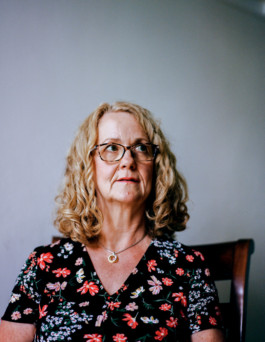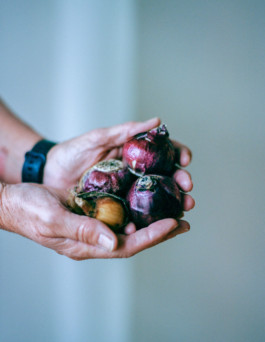Geraldine: “They were so generous… we got football jerseys, we got pyjamas… we got 200 biryanis turning up at the Royal London Hospital”


listen:
Photography: Myah Jeffers
Audio Producer: Sara Conkey
read:
From seed I grew nasturtiums, I grew cornflowers, I grew marigolds. Oh, sweet peas, carnations. Well, I would have grown things from seed before years ago. But, you know, as I’ve got older and busier, I would never have had time to do it. But I wasn’t travelling to and from work, so, and it was beautiful. The weather was beautiful. So I had loads of seeds that were out of date. And I thought, oh, I’ll just try and see what’ll happen. And it was so therapeutic. I used to come down in the morning, and it was, like, so brilliant to just see these things popping up. And I got so excited. I got really excited about it. And I couldn’t wait to come down in the morning to see what I would find and how much they had grown.
My name is Geraldine Cunningham. And I work at Barts Health NHS Trust, and I am the Associate Director of Culture Change. During Covid, I was redeployed to be the lead, trust lead, for staff support and well-being.
In the very, very beginning of Covid, we wanted to make sure that staff were supported to do the very best they could. And that’s both physically and mentally. Because at a time like this, everybody - with good intention - wants to help. So they think they know what the solution is. And actually, what we need to do is find out from the staff themselves: what’s important to them, what really matters?
So in the first week, if I said to staff: ‘What would you like? What do you need?’. People said cake and hand cream. And I kind of thought in my own head: you’re not going to last very long on cake and hand cream. You know, with what’s coming. Which was unpredictable; we didn’t really know what was coming, but it felt scary.
Actually, we were inundated with hand cream. We were totally overwhelmed by the number of businesses and organisations who wanted to give to the NHS and they were so generous: delivering fridges when we said we wanted fridges. We got football jerseys, we got pyjamas, we got towels, we got 30,000 easter eggs delivered at Easter. I remember one day having a call from somebody saying ‘Geraldine we could really do with some iPads’. And the next day the charity called and said, ‘Geraldine, we’ve got five iPads’. And it was as if like, how did that happen?
It felt like, in the very early stages of doing this job, it was like being a fairy godmother, because actually, we practically could have said whatever we wanted, and it seemed to be arriving. From people sending us boxes of dresses to, you know, 200 biryanis turning up at the Royal London Hospital. I was phoned up to say that these 200 curries had arrived at the Royal London Hospital. And that, you know, they were going to send them away. And I was like ‘Oh no’. Particularly because, you know, this is in Whitechapel. Our local community want to support the hospital; it’s going to look really rude if we turn away. And it was very difficult to get them to the wards, but the staff wanted them. And then we were worried about the safety, you know, what if the food was cold, and they ate it, and they became unwell? And actually what tended to happen was they went underground. So actually the curries were getting to the staff no matter what, even though people were trying to stop it.
So it was quite entertaining at times. You had to kind of, kind of let it happen. So that was a bit of a tense time where I was getting loads of calls saying ‘You’ve got to do something about this’. I could do nothing about it. It was unpredictable. And it’s very difficult: we’ve got 24,000 staff at Barts Health; how do we even start to begin to make sure that that’s an equitable process?
In the NHS, you have to remember, we’re not used to getting loads of free things. We’re not used to this outpouring of generosity. So in the early stages, some people were kind of almost fighting over getting it because they didn’t think they’d ever get any more. What the sites did, they started to have a list of all the teams and they made sure it was rotating.
We discovered that a lot of our facilities weren’t as good as we would expect them to be. So the on-call rooms, apparently they’d been telling us for years weren’t very good. So some of them actually didn’t have curtains, or the curtains were hanging off the walls. Or they’d have to go to the linen room on the ward to pick up their own bed linen and a clip to clip the curtains with because the curtains wouldn’t close. Looking like student accommodation in the 1980s and thinking that actually at a time like this, when you’re under so much pressure, you want to be sleeping in a really nice comfortable place where you feel cared for. And the restrooms. Also - safe bike storage. You would never believe that during lockdown, our staff - who to keep themselves safe were cycling to work - had their bikes stolen.
Actually meeting people’s basic needs is essential. And yet in health care, we assume that people who work in healthcare can give, give, give, give, give. And actually, this time, they were getting lots of thank yous. And we were starting to see that actually… maybe some of those basic needs aren’t being met, and we don’t pay enough attention to them. And I think that’s a gift that we now know that, and that we’re going to have these permanent wellbeing hubs. We’re going to do our on-call rooms, we’re going to do our staff rooms, refurbish them all, safe bike storage, somewhere to lock your things when you come to work, so you can feel safe. Now these are things that in a lot of organisations would just be taken for granted. But in the NHS, we prioritise patients first. And actually, really, fundamentally, we have to prioritise staff first, because the more we care for staff, and the safer they feel, when they come to work, the better they are able to provide safe and compassionate care to patients.
And also the psychological support. One of our anaesthetists at the Royal London Hospital, he was involved in the London bombings, and he suffered with post-traumatic stress disorder after the London bombings. And he felt very, very passionate about improving wellbeing. And I said, ‘Great, we’ll do it, it will be possible’. And he said, ‘Geraldine, I’ve been trying for two years, what makes you think you can do it?’ so I said, ‘Context, the context has changed. We can definitely do it’. So we had our clinical psychologists offering support and in the morning, they had between 50 and 90 staff turning up. And they could either do a mindfulness session, they could do a yoga session. Or they could talk to the psychologist about their experience of Covid or being redeployed, coming to work and being you know, faced with patients with Covid - would they be taking it home? Really, really stressful. And seeing deaths at a rate that they wouldn’t normally see, and knowing they were dying from something that they were now exposing themselves to, you know, was phenomenal bravery.
I think that was really upsetting, when you heard that staff were dying and how fearful that would make staff working.
I feel emotional now even talking about it.
So I don’t want to go back to my old job just yet.
Even weekends, you know, I just worked for the first six weekends. And I don’t… I don’t… I don’t resent doing any of that. I enjoyed it. It was, you know, I was getting a buzz out of it.
Somebody said to me one day that you seem to have come into your own. So hopefully, I’ve done well in terms of supporting all my colleagues as much as I possibly can.
An Empathy Museum project made with the support of NHS England and NHS Improvement, The Health Foundation, and Arts Council England